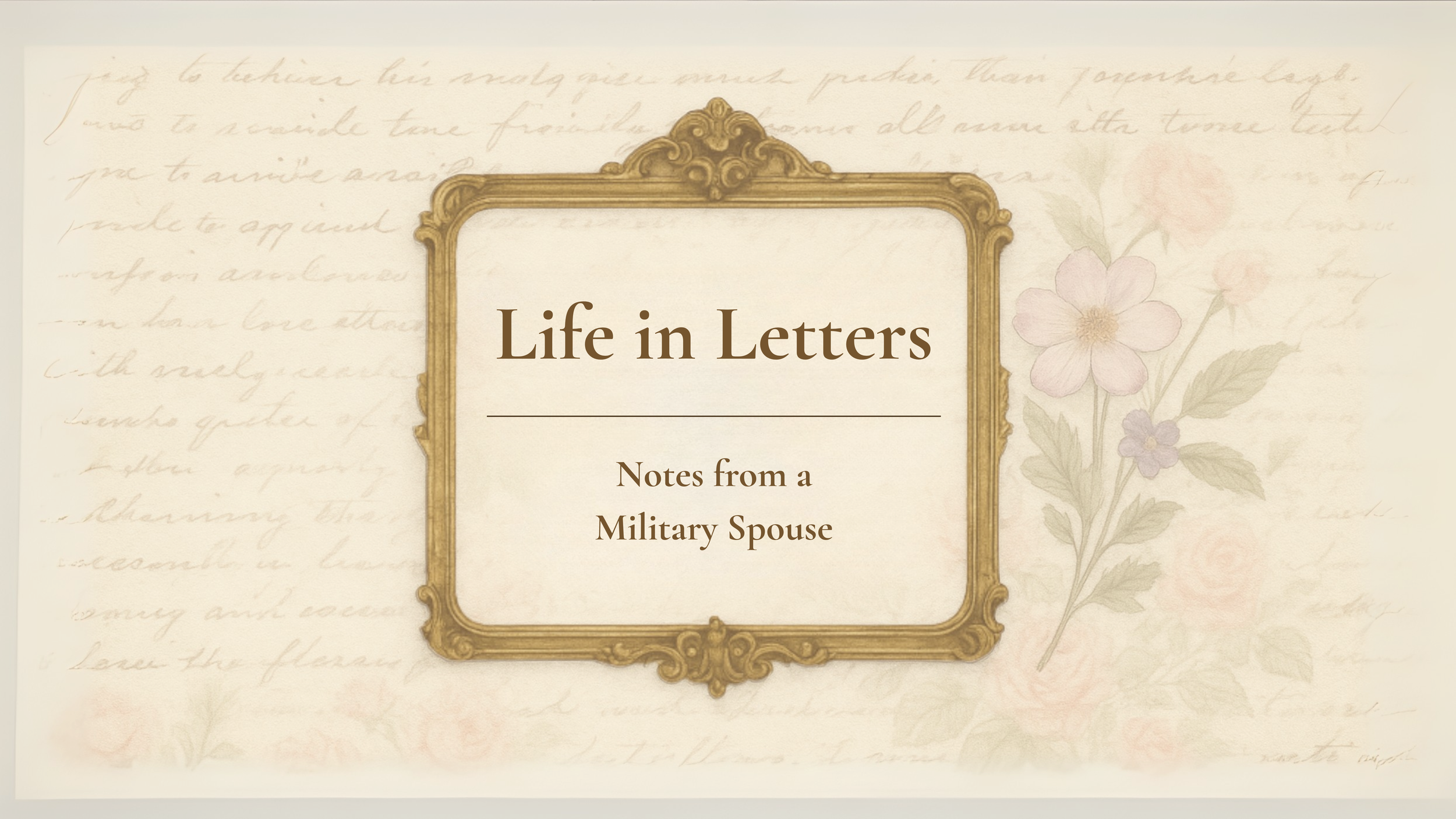
There is a particular relief that comes from knowing where you are meant to stand in a day. Not because the day is easy or especially gentle, but because it is known. The constant decision-making quiets. The internal bargaining softens. You are no longer asking yourself, at every turn, what comes next.
It comes the way most things do in this life: quietly, almost unnoticed, slipping in beside the routines already in motion. The same coffee mug waits on the counter. The same kitchen light hums on before the house stirs. The same life continues, intact and unfolding, even as the calendar insists we call it something different.
And uncertainty, as this year ends, is not abstract. It is layered and present, already pressing forward. Change is coming — movement, transition, another reshaping of what home will look like — and military life has taught me that no amount of planning removes the unknown. Every year arrives carrying something new, whether we feel ready or not.
This is not the pause at the end of the season, the exhale that comes when everything is over. It is the breath taken while standing in the doorway, hands finally still, before stepping back into the noise and movement of what is to come. It is the quiet recognition that nothing more can be added without asking something back in return, and that continuing to press forward will not necessarily make what follows more meaningful—only more exhausting.
Tradition, I’ve learned, is where memory becomes motion — a continuity of light passed hand to hand, glowing differently in each new keeper’s palm. It honors where we come from and welcomes what we discover along the way.
There is no right answer to the question of where you “should” be this December. There is only the truth of what your family needs, and the quiet courage it takes to honor that.
The holidays never sweep in all at once; they arrive gently, on tiptoe. For us, the beginning is marked by a carton of eggnog waiting in the fridge until Black Friday, by music humming through the kitchen, and by the tree rising in its corner while the children scatter boxes of ornaments like treasure.
There are seasons in this life when miles stretch longer than we’d like—deployments, TDYs, or even the ordinary separations of being scattered far from the people who know us best. In those seasons, I’ve learned that gratitude behaves like a seed: small, intentional, sometimes planted in rocky ground.
I recall my first deployment as a spouse as though it were only yesterday. I was ten weeks postpartum, tired in both body and spirit, still trying to find my rhythm as a new mother. The days leading up to departure were a blur of sleepless nights and tender hours, when I wanted every moment to count but felt too drained to hold it all. The goodbye itself was painful, but what nearly undid me was the sight of the calendar — a stretch of time marked only by uncertainty. Four months was promised, but it could stretch to six. That kind of open horizon is heavy when your heart is already weary.
Each November, as Veterans Day draws near, I find myself reflecting on the many faces behind the word service. It’s a word that has quietly shaped every season of my life — as a daughter watching her father lace up his boots, as a wife who knows the rhythm of duty days and homecomings, as a mother teaching her children what it means to belong to something greater than ourselves.
Walking beside command as a spouse is its own season of life. It is not about fancy events or borrowed status—it is about being the partner of a leader, adapting as family life bends around leadership demands. When the phone rings, Beloved must answer, and my role is to adjust, to hold space, and to steady our family in the midst of that constant push and pull.
Sometimes it creeps in quietly, a whisper that says, you should be doing more, being more, achieving more. Other times it crashes in like a wave, leaving you feeling small, inadequate, and suddenly very tired. Comparison is sneaky that way—it convinces us to measure our lives against someone else’s highlight reel, forgetting that we don’t see the mess behind their closed doors. It is, as they say, the thief of joy. And I have let it steal from me more times than I’d like to admit.
Across the force, families are adjusting and re-adjusting. Airmen are stretching savings and spirits. Civilians are balancing loyalty to the mission with the weight of unpaid days. And through it all, we keep hearing the same quiet truth: it shouldn’t be this hard to serve with heart.
Over time, I have come to understand that traditions, too, must gently yield as life demands. Some years we embrace them fully, reveling in every detail. Other years, like the one when I was heavy with Bean and carrying the weight of a long TDY alone, tradition meant nothing more than spreading pumpkin butter on bread and calling it enough. And it was.
People love to toss out the phrase, “you knew what you signed up for.” But you and I both know — that isn’t true. There was no fine print in our vows outlining deployments, distance, or the slow erosion of plans we once thought were ours to create. We didn’t sign a contract of sacrifice. We said yes to a person, not to the unspoken terms that came bundled with their service. What followed has often felt less like a choice and more like learning to juggle far too many things at once — each with its own weight and consequence.
There are losses so deep that words fail us, and silence becomes the only companion that feels safe. For many of us, pregnancy loss is one of those moments. It is the kind of grief that can happen in the quiet corners of our lives—often unseen, often unspoken, yet forever altering the shape of our hearts.
True friendships in this life are not bound by geography. Distance may stretch the silver threads thin, yet in their endurance they take on a golden shine, deepening into strands that glow richer with time. Often, the people one least expects to remain are the very ones who anchor us — steady and sure — reminding us that home is not merely a place but the people who stay woven into the fabric of our hearts.
We find ourselves in a season of not yet. Not yet knowing where the next set of orders will take us. Not yet able to give a polished answer when asked, “So what’s next for you?” Not yet sure when the long-anticipated call will finally come. The “not yet” slips into our lives almost daily — in Bun’s hopeful guesses at the dinner table, in the bedtime whispers that stretch past lights-out, and in the way Beloved and I exchange that look which says, “Still no news?” without the need for words. Even little Bean, though too young to name it, senses the pause in the air of our home.
The news blares and the headlines scroll, but what cuts deepest is not the politics—it is the pause in breath when you realize the paycheck may not come. For so many of us, the math does not bend. A single income stretched to cover a family, a home, the unexpected, and the ordinary. And when that income halts, even for days, the weight is crushing.
Some days, joy does not arrive in sweeping gestures or perfectly framed photographs—it slips quietly into the edges of our lives. It comes in the squeal of laughter when Bean demands another round of “spins,” her curls flying as she twirls around the kitchen in my arms or Beloved’s. It lingers in the weight of Bun pressed against me as his voice insists, "just one more chapter before bed," and I relent because I know he won’t be little forever and all too soon he will stop asking me to read to him all together.
This life moves like the tides—both beautiful and brutal, forever shifting between highs and lows. I love it. I love the friendships that form fast and last across miles, the community that steps in when you need it most, the purpose that steadies me when I start to wonder what it’s all for. And I hate it too—the solo parenting, the 2 a.m. phone calls, the way the unseen work of keeping a family afloat is quietly placed on our shoulders. Both are true. Both live inside me.
Fall has always felt like a season of warmth to me—the crisp bite of air, the smell of leaves and woodsmoke, neighbors gathering again after summer’s heat. In military life, fall becomes the settling season: new faces start to feel familiar, routines take shape, and we begin to see what our “new normal” will be for the year ahead. It is a quieter change than summer’s chaos, a reminder that even in constant transition, there are seasons that steady us and help us find our roots again.
Today’s letter is a little different. With my father marking his forty-year Academy reunion, I am setting aside my usual words to you and instead writing to him. The United States Air Force Academy shaped him, and in turn, he helped shape me. In sharing these words, I hope you catch a glimpse of the legacies that ripple quietly through our families—and how they shape us still.
Resilience is not merely surviving; it is choosing to live fully in the middle of what feels impossible. It is the legacy they handed down: not in speeches or medals, but in daily choices that stitched community, hope, and endurance into the fabric of their families
September 11th is not merely a date on the calendar—it is a marker of the world we entered as military families. It shaped the missions our beloveds would undertake, the deployments that came, and the friendships forged in hardship and separation. It shaped us, too—the families who learned to wait, to endure, to steady ourselves through uncertainty.
Invisible strengths are hard to name, perhaps because they do not trumpet their presence. They grow quietly, like roots beneath the soil, unseen until their hold steadies us. Only when we look back do we realize how much they have carried us, woven through our days like threads of resilience hidden in the fabric of our lives.
One of the quiet gifts of this life is how often neighbors become more than acquaintances. They become the people your children run to after school, the ones who walk into your kitchen without knocking, the ones who slip into your days until you cannot imagine living without them. In a world where change is constant, neighbors have so often been the steadying presence that made each new duty station feel like home.
When I first became a military spouse, I thought being supportive meant saying yes to everything. Yes to meal trains. Yes to volunteering. Yes to planning events, hosting gatherings, and filling every gap I saw. It felt like the only way to prove I belonged, the only way to carry my share of the load. But here is the hard truth: that version of “support” was not sustainable. It left me exhausted, resentful, and teetering on the edge of burnout.
When the last box is broken down, you realize you are not only unpacking belongings—you are unpacking your whole self. With every new introduction, you must decide how much of your story to share, and how much to hold back until trust is earned. It is a vulnerable thing, to present yourself over and over as the newcomer.
When I was growing up as an Air Force child, I believed I knew what military life was all about…So when I became a spouse, I expected it to feel familiar, almost automatic.
But here is what no one tells you: being a military spouse is its own kind of education—and you do not truly learn it until you are living in the middle of it.































Before anything else, I want you to know how glad I am that you are here. Across the many seasons of this life, writing has always been the way I steady myself. Journals tucked on nightstands, scraps of words scribbled between errands, pages filled when the weight of a moment grew too heavy to hold silently—writing has been my companion for as long as I can remember.